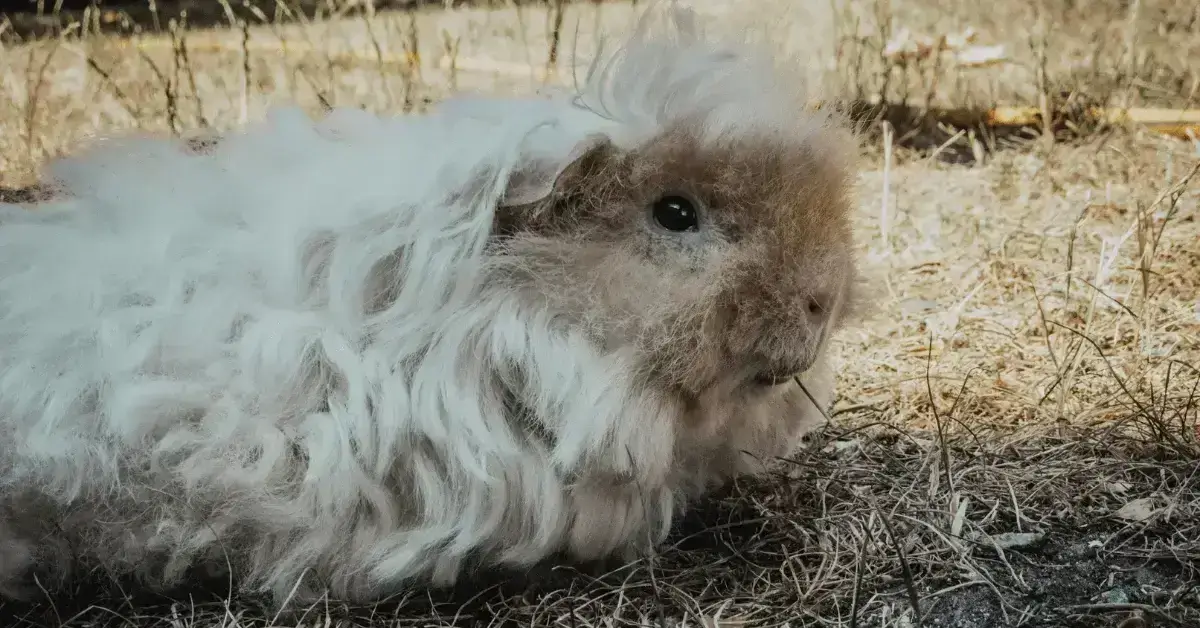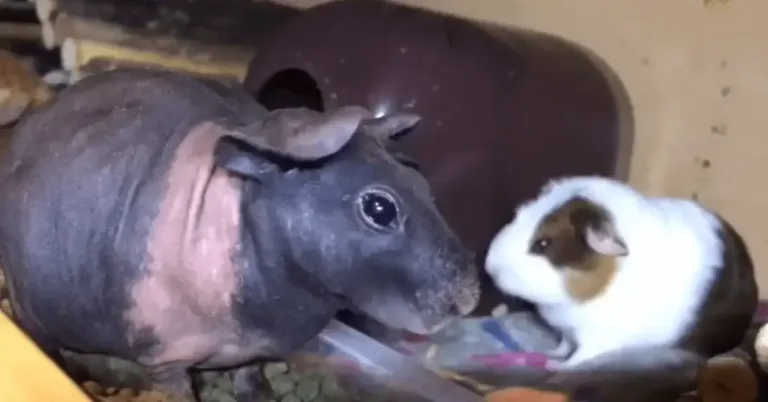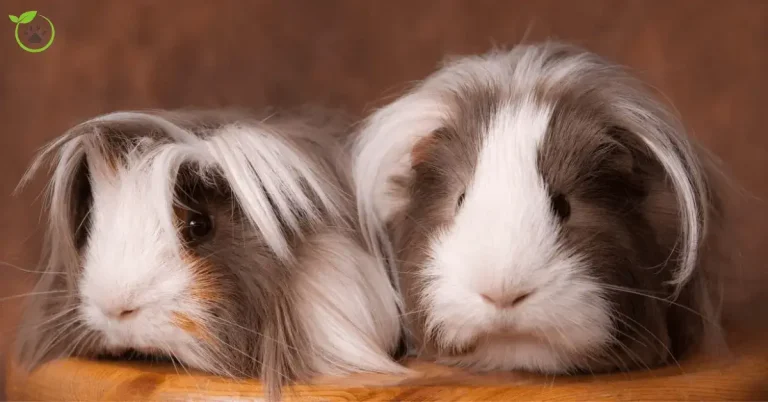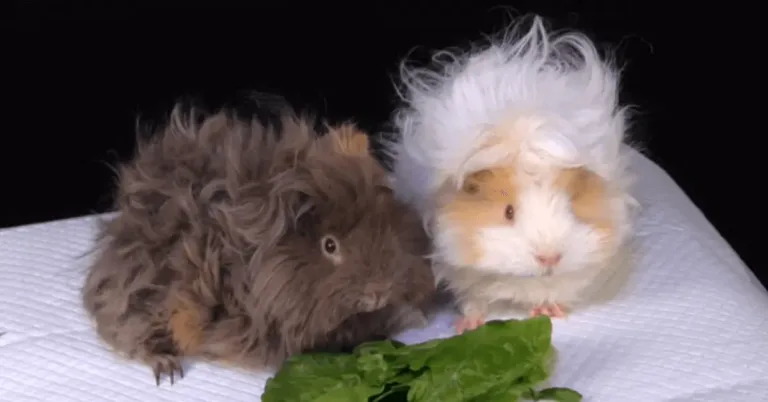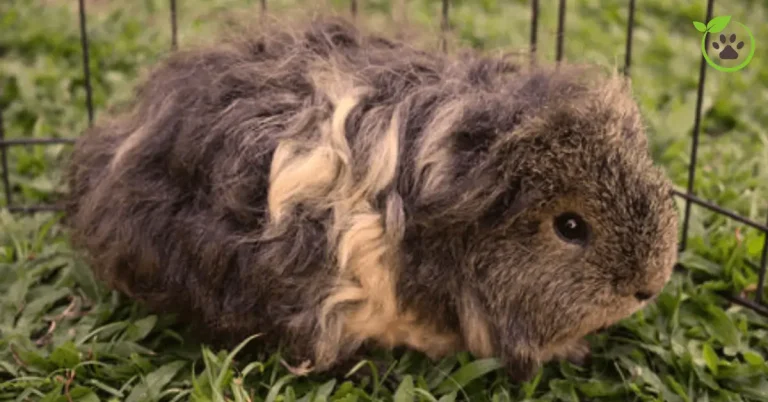The Alpaca Guinea Pig is known for its long, wavy fur that resembles the elegant Peruvian guinea pig. Some of them have rosettes on their heads and bodies, which require special grooming to keep them looking their best. These cute creatures are sometimes mistaken for the Texel breed, but you can tell them apart by the forward-hanging hairs on Alpacas. Due to their long fur, it’s best to keep them indoors, as outdoor conditions can make grooming a bit tricky. In a nutshell, Alpacas are a bit like Peruvian guinea pigs with those lovely curls, and they need some extra care to maintain their unique appearance.
Alpaca Guinea Pig’s Unique Origin and Traits
Sometimes, people mix up the Alpaca guinea pig with the Texel breed. But what sets them apart is quite clear: Alpacas have forward-hanging hair, while Texel’s don’t, and their head hair falls backward.
The exact origin of the Alpaca guinea pig is a subject of debate. Some believe they’re a mix of English Peruvian and Rex guinea pigs. This theory holds weight because Alpacas resemble both Peruvian and Rex guinea pigs and share woolly traits with other guinea pig breeds like Texel, Merino, and Coronet.
In simpler terms, Alpaca guinea pigs bring a touch of curiosity and individuality to the world of guinea pig breeds.
Alpaca Guinea Pig Breed Facts
| Length | 8 – 12 inches |
| Lifespan | 600 – 1200 grams |
| Weight | 4 – 6 years |
| Colors | White, black, beige, brindle, cream, roan, albino |
| Temperament | Sweet and affectionate |
| Suited For | Experienced pet owners |
| Coat Type | Thick, long, coarse and wavy |
| Gestation Period | 59 to 72 days |
Characteristics of Alpaca Guinea Pigs
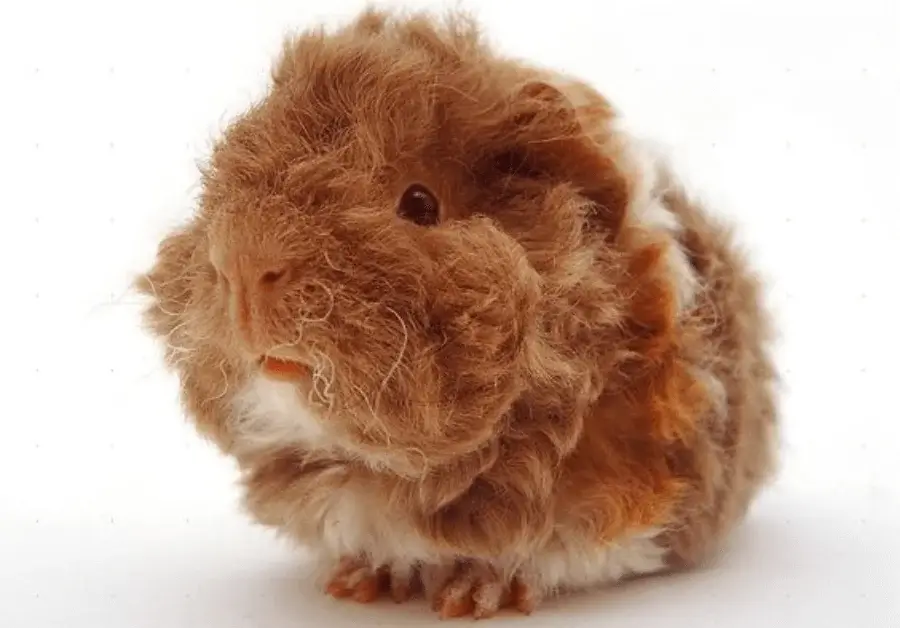
The Unique Physique of Alpaca Guinea Pigs
Alpaca guinea pigs are fascinating creatures that bring a sense of wonder to the world of guinea pig breeds. These unique beings typically measure around 8-12 inches in length and weigh up to 2.5 pounds, making them the perfect size for a charming companion. Their wavy and curly coats come in a delightful array of colors, including white, black, beige, cream, roan, and albino. But what truly sets them apart is their charming rosettes, often found not only on their heads but enhancing their bodies as well.
Alpaca Guinea Pig Personality
Alpaca guinea pigs are not only good looking, but they also have lovely personalities. They are famous for being sweet and loving, which makes them great friends for guinea pig fans. Since they like being part of a group, it’s a good idea to have a couple of guinea pig pals around. This keeps them from feeling lonely and helps keep their minds active. However, just like people, each Alpaca guinea pig is unique and can have its own special character shaped by its surroundings, so you’ll find that no two Alpacas are exactly the same.
Alpaca Guinea Pig Diet
For your Alpaca guinea pig’s well being and joy, it’s vital to provide them with a healthy diet. Similar to other guinea pigs, these curly cuties need a consistent supply of hay and water. Along with that, they should have pellets and a daily portion of fruits and vegetables to meet their dietary requirements. These foods supply important nutrients like vitamin C and calcium. Keeping their diet balanced is essential to prevent overloading on any one nutrient.
Features of Alpaca Guinea Pig
Interestingly, the most captivating feature of Alpaca guinea pigs is their unique appearance. Their long, curly hair is like a beautiful piece of art that makes them stand out from the rest. They have special rosettes that add to their charm. Just like Peruvian guinea pigs, Alpacas have two rosettes on their rump, which makes their woolly coats grow towards their heads. An irregular rosette on their forehead gives them a cute “bangs” look, and the hair on their muzzle grows forward, creating adorable sideburns. When their coats grow long enough, they naturally curl into these enchanting spirals, giving them a texture similar to sheep’s wool.
Their eyes are captivating and reflect the depth of their personalities. When they are babies, they look a bit like comical, slightly annoyed hedgehogs. Their hair sticks out in all directions, and little sideburns start growing on their muzzles, giving them that cute, grumpy expression they are known for. You can spot the two special rosettes on their hips, making them easily recognizable.
Fact
while most guinea pig breeds have fur growing downward from their claws, Alpaca guinea pigs have fur that grows upward. This unique feature adds to their overall charm.
As you welcome an Alpaca guinea pig into your life, you’re not just bringing home a pet; you’re embarking on a journey of companionship and wonder with one of nature’s most captivating creations.
Grooming Your Alpaca Guinea Pig
Taking care of your Alpaca guinea pig is crucial, especially when it comes to their distinctive long and curly coat. These adorable pets need extra care to maintain their appearance and overall health.
In this article, we’ll discuss the key grooming practices, including daily brushing and occasional baths, and underscore the significance of being aware of common health issues.
Daily Brushing for Alpaca Guinea Pigs
The distinctive hair of Alpaca guinea pigs can accumulate debris throughout the day. Daily brushing is crucial for preventing knots, tangles, and matting, which can be painful and uncomfortable for your pet. When you brush your guinea pig, use soft and gentle strokes to avoid pulling their hair, causing distress. Additionally, offering a tasty treat during the grooming session can help keep them calm and build a stronger bond between you and your furry companion.
Keeping Long Haired Guinea Pigs Safe from Flies
Alpaca guinea pigs, with their long and curly hair, can easily attract flies if their fur gets dirty. A messy coat is like a playground for flies, where they can lay eggs and cause severe skin infections in your guinea pig. This situation can be very dangerous, so it’s crucial to keep your Alpaca guinea pig clean by regularly grooming them.
Pedicures for Alpaca Guinea Pigs
Trimming your guinea pig’s nails is an essential part of grooming to maintain their health and comfort. The frequency of nail trimming varies depending on factors such as age, activity level, and diet. Younger guinea pigs typically have faster nail growth, and more active ones may wear down their nails naturally. It’s essential to note that guinea pigs can be sensitive to nail clipping, so patience is key. If possible, have a second person assist you in holding your guinea pig while you trim their nails.
Pedicure Tools
When it comes to trimming your guinea pig’s nails, it’s important to use nail clippers specifically designed for small animals. Be cautious not to cut the nails too short, as this can lead to bleeding. If bleeding does occur, you can stop it by applying styptic powder or gently pressing a paper towel against the affected area until it stops.
Dental Care for Guinea Pigs
Guinea pig teeth are continuously growing, especially if they receive a diet rich in vitamin C. However, their teeth usually wear down naturally through the consumption of hay, fruits, and vegetables. If their diet lacks these essential elements, their teeth may grow too long, potentially leading to impaction and discomfort. In such cases, a visit to the veterinarian is necessary for proper treatment.
Common Health Concerns in Alpaca Guinea Pigs
Alpaca guinea pigs are generally healthy pets, with some individuals living for up to eight years. However, it’s important to be aware of common health issues that can affect them and recognize the symptoms that require attention.
Pneumonia
Pneumonia is a significant health concern for guinea pigs. Many guinea pigs can carry pneumonia-causing bacteria for years without displaying symptoms. Signs of pneumonia include reduced appetite, watery discharge from the eyes and nose, and difficulty breathing. If you notice these symptoms, it’s crucial to seek immediate veterinary care.
Diarrhea and Digestive Health
Guinea pigs, including Alpaca guinea pigs, have delicate digestive systems that can become imbalanced easily. An unstable digestive system can lead to uncomfortable gas and diarrhea. Signs of digestive imbalance include diarrhea, weight loss, low body temperature, and dehydration. If your pet displays these symptoms, it’s important to consult with a veterinarian.
Scurvy
Scurvy can occur in guinea pigs due to a lack of vitamin C. Since guinea pigs do not produce this essential vitamin in their bodies, they rely on their owners to provide the right amount of vitamin C to maintain their health. Signs of scurvy include a rough coat, diarrhea, reluctance to walk, and swollen feet. If you observe these signs, it’s advisable to seek veterinary care promptly.
Urinary Problems and Bladder Stones
Urinary tract problems, particularly bladder stones, can affect many guinea pigs. These stones can sometimes become stuck in the urethra, causing pain or even death. Bladder stones are often the result of a diet high in calcium. Signs of urinary problems include bloody urine, a hunched posture, and frequent urination. If you notice these symptoms, contact your veterinarian immediately.
Temperament and Intelligence of the Alpaca Guinea Pig

The Alpaca guinea pig is renowned for its affectionate and friendly temperament, making it an ideal addition to any family. This endearing small pet is not only easy to handle but also adores cuddles, creating a warm bond with its human companions. In addition to their delightful personalities, Alpaca guinea pigs exhibit impressive intelligence, allowing them to navigate complex mazes and understand symbolic road signs.
Are Alpaca Guinea Pigs Suitable for Families?
Absolutely! Alpaca guinea pigs are incredibly family-friendly. Their high level of friendliness makes them wonderful companions for all family members. They possess the intelligence to learn tricks and genuinely enjoy being held and petted. As long as at least one family member can dedicate time to their daily grooming needs, Alpaca guinea pigs are an excellent choice for families seeking a delightful and interactive pet.
Compatibility with Other Pets
The Alpaca Guinea Pig is not just friendly to humans. These adorable creatures get along well with other small animals and are often found snuggling with their fellow furry friends. They are neither hostile nor territorial, making them amiable cage mates for a variety of animals.
Sweet Temperament
Alpaca guinea pigs are cherished for their sweet and gentle nature. They are highly social, relishing the company of both their human owner and fellow guinea pigs. These affectionate pets often exhibit their contentment through purring and vocalizations, expressing their needs with a range of endearing sounds like squeaks and rumbles. Their calm and amiable disposition also makes them an excellent choice for families with children. Their reduced likelihood of becoming upset or nervous minimizes the risk of biting or scratching, creating a safe and enjoyable pet for households with young ones.
Intelligent Companions
While Alpaca guinea pigs may not reach the level of intelligence exhibited by dogs or cats, they display cleverness and adaptability in their own right. These small rodents can recognize their owners, particularly those who provide consistent care and attention. They often respond positively to familiar voices and even come when called. Moreover, Alpaca guinea pigs demonstrate problem solving skills when faced with challenges in their environment. They can figure out how to access their food dish, navigate through tunnels and mazes, and even identify their favorite hiding spots. This ability to adapt to their surroundings underscores their intelligence and adds to their charm. To understand intelligence level of guinea pigs you can also read are guinea pigs smart.
Finding the Perfect Bedding for Alpaca Guinea Pigs
Choosing the right bedding for your Alpaca guinea pigs is a crucial aspect of providing them with a comfortable and healthy living environment. Alpaca guinea pigs, with their long, coarse fur, have specific bedding needs to ensure their well-being. In this guide, we’ll explore the best bedding options to keep your Alpaca guinea pigs happy and content.
The Importance of Suitable Bedding
Bedding plays a significant role in the overall comfort and hygiene of your guinea pigs’ enclosure. It provides a soft and absorbent surface for them to walk on, sleep, and interact with their surroundings. For Alpaca guinea pigs, the choice of bedding is even more critical due to their long and curly fur, which can easily trap loose bedding materials, potentially leading to discomfort and health issues.
The Top Choice Fleece Cage Lining
Fleece cage lining is widely considered the best bedding for Alpaca guinea pigs. It offers several advantages that make it a top choice for these adorable pets:
- Minimized Fur Issues: Fleece bedding significantly reduces the risk of bedding materials getting caught in your guinea pig’s fur. This is essential for Alpaca guinea pigs, as their long and curly coats are more prone to trapping debris.
- Comfortable and Soft: Fleece provides a soft and cushioned surface for your pets to walk on and lounge, ensuring their comfort and well-being.
- Easy Maintenance: Fleece bedding can be easily cleaned by shaking off or brushing away any waste, and it’s conveniently machine washable, making it a practical option for busy pet owners.
However, it’s important to note that fleece bedding should be washed regularly, particularly for Alpaca guinea pigs, as they tend to shed more hair than short-haired breeds.
Alternatives to Fleece Bedding
If you prefer alternatives to fleece bedding for your Alpaca guinea pigs, there are a couple of options to consider:
- Paper-based Bedding: Paper bedding is another safe and comfortable choice for guinea pigs. It’s absorbent, easy to maintain, and can provide a cozy environment for your pets.
- Wood Pulp Bedding: Wood pulp bedding is soft and absorbent, offering a suitable surface for guinea pigs to walk on and rest comfortably.

When using these alternatives, ensure that you regularly clean and replace the bedding to maintain hygiene in your guinea pigs’ habitat.
Bedding Types to Avoid
Some bedding materials should be avoided for Alpaca guinea pigs, as they can lead to discomfort or health problems:
- Straw: Straw should never be used as bedding for guinea pigs, as it can be uncomfortable and lead to hygiene issues.
- Hay Bedding: While guinea pigs require a constant supply of edible hay, using regular hay as bedding is not recommended, especially for longhaired breeds like Alpaca guinea pigs.
- Wood Shavings: Wood shavings can quickly become trapped in an Alpaca’s fur, causing discomfort and hygiene issues.
- Sawdust: Sawdust should be avoided at all costs, as it can lead to respiratory problems and is harmful to guinea pigs.
Indoors vs Outdoors
For the well-being of your Alpaca guinea pigs, it is highly recommended to keep them indoors. Outdoor hutches are not suitable for longhaired guinea pig breeds. These social creatures thrive in environments with regular human interaction and can easily become wet and dirty when kept outdoors. This can lead to bacterial buildup and an increased risk of mites and parasites. Keeping your Alpaca guinea pigs indoors ensures their health and happiness.
Key Points
- Alpaca guinea pigs are cherished for their friendly and gentle nature.
- They are social creatures that enjoy human interaction and are excellent for families.
- Fleece bedding is the preferred choice for Alpaca guinea pigs due to its comfort and ease of maintenance.
- Alternatives like paper-based and wood pulp bedding can also be considered.
- Avoid unsuitable bedding materials that can cause discomfort or health problems.
- Keeping Alpaca guinea pigs indoors is essential for their well-being, as outdoor conditions can lead to hygiene and health concerns.
- These charming pets are more than just farm animals; they are interactive and affectionate companions that add warmth to farm environments.
Frequently asked Questions(FAQ’s)
What are Alpaca guinea pigs known for?
Alpaca guinea pigs are renowned for their long and curly fur, gentle temperament, and intelligence, making them unique and endearing pets.
How often should I brush my Alpaca guinea pig’s long hair?
To prevent matting and tangles, it’s recommended to brush your Alpaca guinea pig’s hair daily. This daily routine helps maintain the health and appearance of their unique coat.
How should I trim my Alpaca guinea pig’s nails?
Guinea pig nails should be trimmed at least once a month, but the frequency may vary among individuals. Use small animal nail clippers and be cautious not to trim too close to the quick. If bleeding occurs, apply styptic powder or gently press a paper towel on the affected area.
How can I introduce a grooming routine to my Alpaca guinea pig?
To acclimate your guinea pig to grooming, start with short sessions and offer their favorite food during the process. This positive reinforcement can make grooming more enjoyable for them and help build a bond between you and your pet.
How can I tell if my Alpaca guinea pig needs a bath?
If your guinea pig’s hair becomes soiled, especially around the rear end, it’s a sign that they may need a bath. Keep an eye on their cleanliness to determine when it’s necessary.
Conclusion
Alpaca guinea pigs are delightful and charming farm animals known for their friendly and sociable nature. They make wonderful additions to farm environments, offering not only their endearing personalities but also their unique long, curly coats. These animals are easy to handle and enjoy human interaction, making them suitable for families and farm settings.
When keeping Alpaca guinea pigs on a farm, it’s crucial to provide them with appropriate bedding, such as fleece, to ensure their comfort and hygiene. Alternatives like paper-based or wood pulp bedding can also be considered. It’s important to avoid unsuitable bedding materials, such as straw or regular hay, as they can lead to discomfort.
Moreover, keeping Alpaca guinea pigs indoors is highly recommended for their well-being. Outdoor hutches are not suitable for these longhaired breeds, as they are prone to becoming wet and dirty, which can lead to health concerns.

